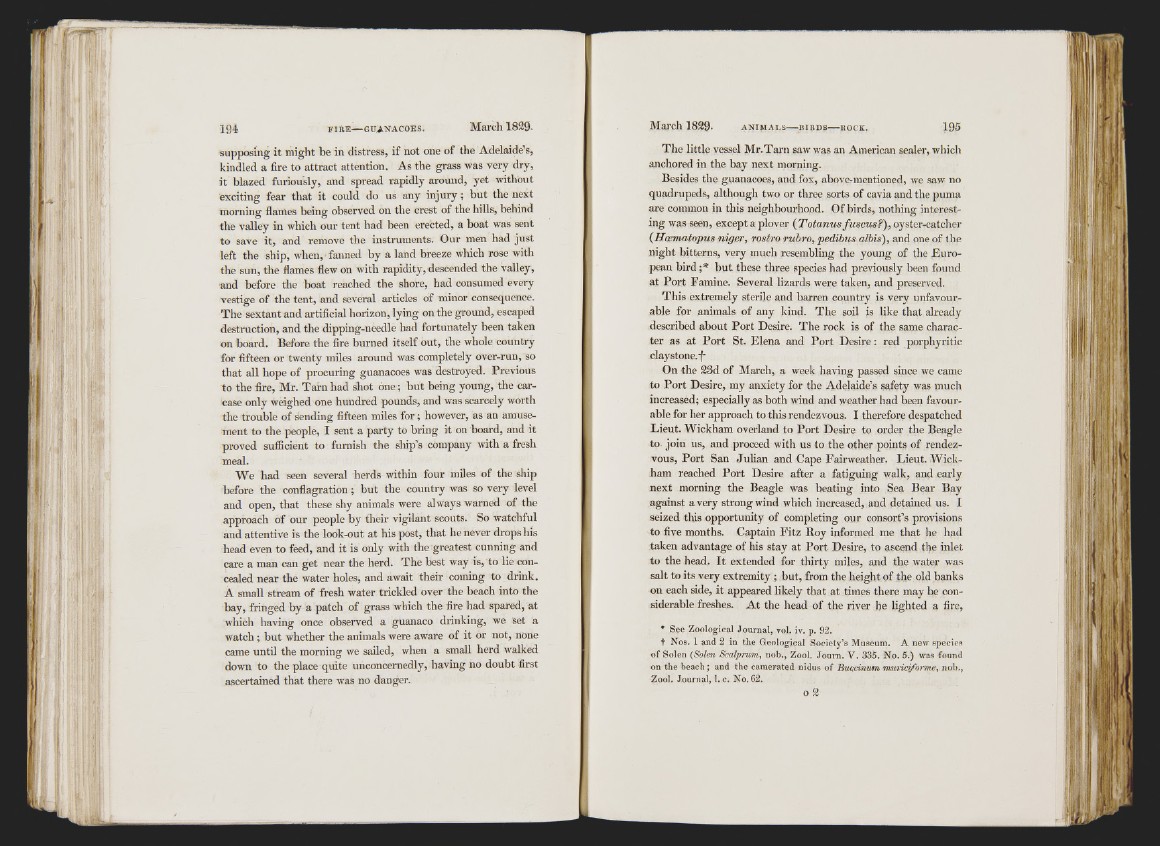
; . ■
'I '
i! .
ii
4
iî
si ii
! ,
"U
4 ; / 4 I
4 L IIi
r -
;<Î 4 I
! <|i I.
4 4 | i II
r ■ i - , i ' '
. 1 ; 4
supposing it might be in distress, if not one of the Adelaide’s,
kindled a fire to attract attention. As the grass was very dry,
it blazed furiously, and spread rapidly around, yet without
exciting fear that it could do us any injury; but the next
morning flames being observed on the crest of the hills, behind
the valley in which our tent had been erected, a boat was sent
to save it, and remove the instruments. Our men had just
left the ship, when, fanned by a land breeze which rose with
the sun, the flames flew on with rapidity, descended the valley,
and before the boat reached the shore, had consumed every
vestige of the tent, and several articles of minor consequence.
The sextant and artificial horizon, lying on the ground, escaped
destruction, and the dipping-needle had fortunately been taken
on board. Before the fire burned itself out, the whole country
for fifteen or twenty miles around was completely over-run, so
that all hope of procuring guanacoes was destroyed. Previous
to the fire, Mr. Tarn had shot one; but being young, the carcase
only weighed one hundred pounds, and was scarcely worth
the trouble of sending fifteen miles for; however, as an amusement
to the people, I sent a party to bring it on board, and it
proved sufficient to furnish the ship’s company with a fresh
meal.
W e had seen several herds within four miles of the ship
before the conflagration ; but the country was so very level
and open, that these shy animals were always warned of the
approach of our people by their vigilant scouts. So watchful
and attentive is the look-out at his post, that he never di-ops his
head even to feed, and it is only with the greatest cunning and
care a man can get near the herd. The best way is, to lie concealed
near the water holes, and await their coming to drink.
A small stream of fresh water trickled over the beach into the
bay, fringed by a patch of grass which the fire had spared, at
which having once observed a guanaco drinking, we set a
watch ; but whether the animals were aware of it or not, none
came until the morning we sailed, when a small herd walked
doMTi to the place quite unconcernedly, having no doubt first
ascertained that there was no danger.
The little vessel Mr.Tarn saw was an American sealer, which
anchored in the bay next morning.
Besides the guanacoes, and fox, above-mentioned, we saw no
quadrupeds, although two or three sorts of cavia and the puma
are common in this neighbourhood. Of birds, nothing interesting
was seen, except a plover (To ta n u s fuscus?), oyster-catcher
(Hoematopus niger, rostro ruhro, pedibus albis), and one of the
night bitterns, very much resembling the young of the European
bird;* but these three species had previously been found
at Port Famine. Several lizards were taken, and preserved.
This extremely sterile and barren country is very unfavourable
for animals of any kind. The soil is like that already
described about Port Desire. The rock is of the same character
as at Port St. Elena and Port Desire : red porphyritic
claystone.-f-
On the 23d of March, a week having passed since we came
to Port Desire, my anxiety for the Adelaide’s safety was much
increased; especially as both wind and weather had been favourable
for her approach to this rendezvous. I therefore despatched
Lieut. Wickham overland to Port Desire to order the Beagle
to join us, and proceed with us to the other points of rendezvous,
Port San Julian and Cape Fairweather. Lieut. Wickham
reached Port Desire after a fatiguing walk, and early
next morning the Beagle was beating into Sea Bear Bay
against a very strong wind which increased, and detained us. I
seized this opportunity of completing our consort’s provisions
to five months. Captain Fitz Roy informed me that he had
taken advantage of his stay at Port Desire, to ascend the inlet
to the head. It extended for thirty miles, and the water was
salt to its very extremity ; but, from the height of the old banks
on each side, it appeared likely that at times there may be considerable
freshes. At the head of the river he lighted a fire,
* See Zoological Journal, vol. iv. p. 92.
t Nos. 1 and 2 in the Geological Society’s Museum. A new species
of Solen (Solen Scalprum, nob., Zool. Journ. V . 335. No. 5.) was found
on the beach ; and the camerated nidus of Buccinum nairiciforme, nob.,
Zool. Journal, 1. c. No. 62.
n 6>
a;